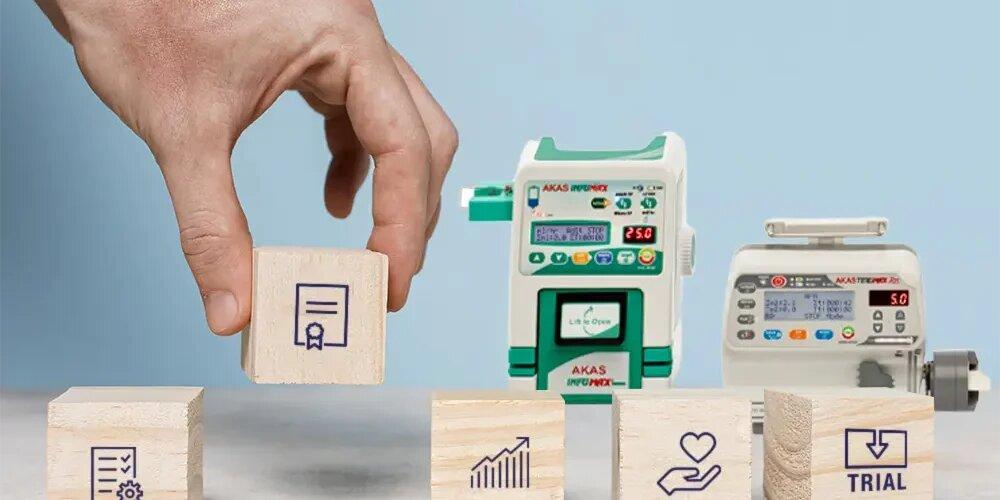Notifications

6 minutes, 14 seconds
-66 Views 0 Comments 0 Likes 0 Reviews

The delivery of intravenous medication is a cornerstone of hospital care.
Every infusion must be accurate, consistent, and safe for the patient.
An infusion pump for hospital use plays a critical role in achieving these outcomes.
Procurement decisions can directly influence patient safety.
A well-chosen infusion pump supports treatment precision and reduces clinical errors.
Hospitals need reliable, efficient, and compliant devices from trusted manufacturers.
An infusion pump controls the rate and volume of medication administered intravenously.
It ensures that fluids, nutrients, or drugs are delivered with exact timing.
This is essential in intensive care, paediatrics, oncology, and anaesthesia departments.
Infusion pumps help avoid manual dosage errors.
They maintain accurate and steady infusion rates.
This supports treatment plans that depend on continuous or timed medication delivery.
Hospitals should first determine which type of infusion pump fits their needs.
Volumetric pumps are ideal for high-volume fluid delivery.
Syringe pumps are suited for low-volume and highly sensitive drug administration.
Each clinical unit may require a different infusion pump type.
Procurement teams must consult with department heads for accurate demand forecasting.
Matching the right device to the specific application is essential for performance.
An infusion pump must meet strict international safety and calibration standards.
Look for devices with built-in alarms for air-in-line, occlusion, and battery failure.
Smart technology with dose error reduction systems (DERS) improves medication safety.
Precision in dosing is vital for high-risk patients.
Infusion pumps should have verified accuracy in flow rates and minimal deviation.
Alarm clarity and response time are key for nurse intervention when necessary.
Hospitals benefit from devices that integrate with Electronic Medical Records (EMR).
Infusion pumps with smart connectivity improve monitoring and reduce transcription errors.
Seamless data transfer supports accurate documentation and analysis.
Compatibility with hospital-wide systems saves time during audits.
Procurement teams should prioritise pumps with open architecture or vendor-neutral platforms.
This futureproofs the investment and supports multi-brand ecosystems.
User-friendly infusion pumps reduce learning curves and human error.
Interfaces should be intuitive, with clear displays and simple programming steps.
Consider manufacturers that offer training materials, certifications, and user support.
High staff turnover in hospitals demands equipment that’s easy to operate.
Pumps must have standardised layouts across models for consistency.
Easy-to-clean and durable designs are also essential in infection control.
Service contracts and spare parts availability are crucial to reduce downtime.
Hospitals need responsive technical support from infusion pump manufacturers.
Warranty periods and preventative maintenance schedules should be clearly defined.
Long device lifespans rely on strong manufacturer partnerships.
Procurement teams should evaluate past service records and customer satisfaction.
On-site training and annual inspections are valuable additions to service agreements.
All infusion pumps must comply with medical device standards and certifications.
Look for CE-marked or FDA-approved devices based on regional compliance needs.
Documentation should include risk assessments, performance testing, and conformity reports.
Infusion pumps must align with infection prevention protocols.
Ensure devices meet hospital sterilisation, cleaning, and handling standards.
Avoid non-compliant models that could pose legal and safety risks.
Initial purchase price is just one aspect of total ownership cost.
Include consumables, maintenance, training, and upgrades in budgeting.
Some infusion pump models offer long-term savings through lower failure rates.
Leasing and subscription models may suit hospitals with budget constraints.
Modular systems allow phased implementation and cost spreading.
The right infusion pump for hospital care balances affordability with long-term value.
Choose suppliers with a proven record in hospital-grade medical devices.
Years of industry experience and product innovation matter in critical care delivery.
Feedback from existing hospital clients adds reliability to your decision.
Ask about quality assurance processes and manufacturing certifications.
Consistent product quality reduces returns and maintenance interruptions.
Work only with infusion pump manufacturers committed to high standards.
Choosing the right infusion pump for hospital use requires informed decision-making.
It involves balancing safety, accuracy, integration, usability, and cost-effectiveness.
Procurement teams play a vital role in ensuring clinical reliability and operational success.
Hospitals deserve trusted partners in this decision.
Akas Infusion is a recognised name in the field, manufacturing world-class drug delivery devices.
Their range of volumetric infusion pumps is designed to meet the evolving demands of modern healthcare with precision, safety, and care.
